约翰·斯坦贝克诺贝尔文学奖的英文获奖感言
诺贝尔奖获奖感言英语作文

诺贝尔奖获奖感言英语作文Thank you so much for this incredible honor. I am truly humbled and grateful to receive the Nobel Prize. It is a recognition that I never could have imagined when I first started my work in this field.I want to express my deepest gratitude to all the people who have supported me along the way. From my mentors and colleagues to my family and friends, I could not have achieved this without their unwavering support and encouragement.This award is not just a personal achievement, but a testament to the power of collaboration and innovation. I am proud to be part of a community that is dedicated to pushing the boundaries of knowledge and making a positive impact on the world.I hope that this recognition will inspire others to pursue their passions and never give up on their dreams.The road to success may be long and challenging, but with determination and perseverance, anything is possible.In closing, I want to thank the Nobel Committee forthis incredible honor and for recognizing the importance of the work that we do. I am truly grateful and will continue to strive for excellence in my research and contributions to society. Thank you.。
诺贝尔获奖者领奖词

• 播的,它既不是供深居简出的特权 阶层娱乐的,也并非是陷于绝望、 但又喜好自吹的乞丐们的一种游戏。 • 文学与言语一样源远流长,它是 应人们的需求而产生的,除了对这 种需求的日益增长外,文学并没有 发生什么变化。吟唱诗人、行吟诗 人和作家并不是独立的和相互排斥 的,从一开始,他们的作用、义务 和职责就由我们人类规定好了。
• for transforming the way that we use energy. • We can't allow the differences between peoples to define the way that we see one another. And that's why we must pursue a new beginning among people of different faiths and races and religions, one based upon mutual interest and mutual respect. • And we must all do our part to resolve those conflicts that have caused so much pain and hardship over so many years.
• 能或不会与之齐头并进。无疑,作家 的部分职责就是确保它们一起向前发 展。人类曾坚定不移地与一切自然界 的仇敌进行斗争,有时几乎不可避免 的失败和毁灭,既然我们有着如此悠 久并值得自豪的历史,那么,倘若我 们还未能取得伟大的胜利就逃离战场, 那我们就成了懦夫和愚人。
奥巴马的获奖感言
• Good morning. Well, this is not how I expected to wake up this morning. After I received the news, Malia walked in and said, "Daddy, you won the Nobel Peace Prize, and it is Bo's birthday." And then Sasha added, "Plus, we have a three-day weekend coming up." So it's -- it's good to have kids to keep things in perspective.
英文获奖感言3篇_礼仪
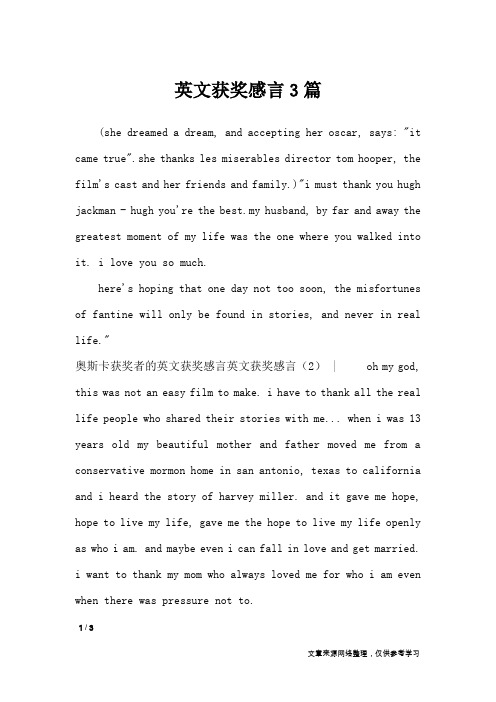
英文获奖感言3篇(she dreamed a dream, and accepting her oscar, says: "it came true".she thanks les miserables director tom hooper, the film's cast and her friends and family.)"i must thank you hugh jackman - hugh you're the best.my husband, by far and away the greatest moment of my life was the one where you walked into it. i love you so much.here's hoping that one day not too soon, the misfortunes of fantine will only be found in stories, and never in real life."奥斯卡获奖者的英文获奖感言英文获奖感言(2) | oh my god, this was not an easy film to make. i have to thank all the real life people who shared their stories with me... when i was 13 years old my beautiful mother and father moved me from a conservative mormon home in san antonio, texas to california and i heard the story of harvey miller. and it gave me hope, hope to live my life, gave me the hope to live my life openly as who i am. and maybe even i can fall in love and get married.i want to thank my mom who always loved me for who i am even when there was pressure not to.1 / 3if harvey had been alive today, i think he'd want me to say to all the gay and lesbian kids out there that have been told that they are less than by their churches, their government or their families that they are beautiful, wonderful creatures of value and no matter what anyone tells you, god does love you and that very soon i promise you, you will have equal rights, federally, across this great nation of ours. thank you. thank you. and thank you, god, for giving us harvey milk.奥斯卡颁奖典礼的英文获奖感言英文获奖感言(3) | good evening! ladies and gentlemen,thank you! thank you so much! oh, my god. i just can’t believe it. is it real or just a dream? please forgive me, i am, i am just so shocked and so thankful. i never expected this award tonight. i’m very grateful to receive this award for “best actress.”i can’t begin to tell you how much i appreciate this great honor. there are so many people i’d like to thank. first of all, i want to thank my parents for bringing me into this world.i also want to express my gratitude to all of my teachers over the years, but especially to my acting teacher clark johnson who taught me everything i know.2 / 3i want to thank my husband, for his understanding and kindness. and finally, i want to express my appreciation to all of my friends for their support, especially to martin miller, for being there when i needed him. there are just too many people i should thank and i know i am probably forgetting someone. so again, i just want to say thank you to everyone who helped me, supported me, or just listened to me when i needed a shoulder to cry on.this award means a great deal to me. words can’t express how honored i feel at this moment. i will remember this night for the rest of my life! thank you very much.约翰·斯坦贝克诺贝尔文学奖的英文获奖感言3 / 3。
2018年诺贝尔获奖感言英文-范文模板 (9页)

2018年诺贝尔获奖感言英文-范文模板本文部分内容来自网络,本司不为其真实性负责,如有异议或侵权请及时联系,本司将予以删除!== 本文为word格式,下载后可随意编辑修改! ==诺贝尔获奖感言英文约翰·斯坦贝克诺贝尔文学奖的英文获奖感言1banquet speechjohn steinbeck's speech at the nobel banquet at the city hall in stockholm, december 10, 1962i thank the swedish academy for finding my work worthy of this highest honor.in my heart there may be doubt that i deserve the nobel award over other men of letters whom i hold in respect and reverence - but there is no question of my pleasure and pride in having it for myself.it is customary for the recipient of this award to offer personal or scholarly comment on the nature and the direction of literature. at this particular time, however, i think it would be well to consider the high duties and the responsibilities of the makers of literature.such is the prestige of the nobel award and of this place where i stand that i am impelled, not to squeak like a grateful and apologetic mouse, but to roar like a lion out of pride in my profession and in the great and good men who have practiced it through the ages.literature was not promulgated by a pale and emasculated critical priesthood singing their litanies in empty churches - nor is it a game for the cloistered elect, the tinhorn mendicants of low calorie despair.。
2018-诺贝尔获奖感言英文-推荐word版 (9页)

本文部分内容来自网络整理所得,本司不为其真实性负责,如有异议或侵权请及时联系,本司将立即予以删除!== 本文为word格式,下载后可方便编辑修改文字! ==诺贝尔获奖感言英文约翰·斯坦贝克诺贝尔文学奖的英文获奖感言1banquet speechjohn steinbeck's speech at the nobel banquet at the city hall in stockholm, december 10, 1962i thank the swedish academy for finding my work worthy of this highest honor.in my heart there may be doubt that i deserve the nobel award over other men of letters whom i hold in respect and reverence - but there is no question of my pleasure and pride in having it for myself.it is customary for the recipient of this award to offer personal or scholarly comment on the nature and the direction of literature. at this particular time, however, i think it would be well to consider the high duties and the responsibilities of the makers of literature.such is the prestige of the nobel award and of this place where i stand that i am impelled, not to squeak like a grateful and apologetic mouse, but to roar like a lion out of pride in my profession and in the great and good men who have practiced it through the ages.literature was not promulgated by a pale and emasculated critical priesthood singing their litanies in empty churches - nor is it a game for the cloistered elect, the tinhorn mendicants of low calorie despair.literature is as old as speech. it grew out of human need for it, and it has not changed except to become more needed.the skalds, the bards, the writers are not separate and exclusive. from the beginning, their functions, their duties, their responsibilities have been decreed by our species.humanity has been passing through a gray and desolate time of confusion. my great predecessor, william faulkner, speaking here, referred to it as a tragedy of universal fear so long sustained that there were no longer problems of the spirit, so that only the human heart in conflict with itself seemed worth writing about.faulkner, more than most men, was aware of human strength as well as of human weakness. he knew that the understanding and the resolution of fear are a large part of the writer's reason for being.this is not new. the ancient commission of the writer has not changed. he is charged with exposing our many grievous faults and failures, with dredging up to the light our dark and dangerous dreams for the purpose of improvement.furthermore, the writer is delegated to declare and to celebrate man's proven capacity for greatness of heart and spirit - for gallantry in defeat - for courage, compassion and love. in the endless war against weakness and despair, these are the bright rally-flags of hope and of emulation.i hold that a writer who does not passionately believe in the perfectibility of man, has no dedication nor any membership in literature.the present universal fear has been the result of a forward surge in our knowledge and manipulation of certain dangerous factors in the physical world.it is true that other phases of understanding have not yet caught up with this great step, but there is no reason to presume that they cannot or will not draw abreast. indeed it is a part of the writer's responsibility to make sure that they do.with humanity's long proud history of standing firm against natural enemies, sometimes in the face of almost certain defeat and extinction, we would be cowardly and stupid to leave the field on the eve of our greatest potential victory.understandably, i have been reading the life of alfred nobel - a solitary man, the books say, a thoughtful man. he perfected the release of explosive forces, capable of creative good or of destructive evil, but lacking choice, ungoverned by conscience or judgment.nobel saw some of the cruel and bloody misuses of his inventions. he may even have foreseen the end result of his probing - access to ultimate violence - to final destruction. some say that he became cynical, but i do not believe this. i think he strove to invent a control, a safety valve. i think he found it finally only in the human mind and the human spirit. to me, his thinking is clearly indicated in the categories of these awards.they are offered for increased and continuing knowledge of man and of his world - for understanding and communication, which are the functions of literature. and they are offered for demonstrations of the capacity for peace - the culmination of all the others.less than fifty years after his death, the door of nature was unlocked and we were offered the dreadful burden of choice.we have usurped many of the powers we once ascribed to god.fearful and unprepared, we have assumed lordship over the life or death of the whole world - of all living things.the danger and the glory and the choice rest finally in man. the test of his perfectibility is at hand.having taken godlike power, we must seek in ourselves for the responsibility and the wisdom we once prayed some deity might have.man himself has become our greatest hazard and our only hope.so that today, st. john the apostle may well be paraphrased: in the end is the word, and the word is man - and the word is with men.诺贝尔奖获得者Obama英语获奖感言2Good morning. Well, this is not how I expected to wake up this morning. After I received the news, Malia walked in and said, "Daddy, you won the Nobel Peace Prize, and it is Bo's birthday." And then Sasha added, "Plus, we have a three-day weekend coming up." So it's -- it's good to have kids to keep things in perspective.早上好。
约翰·斯坦贝克诺贝尔文学奖的英文获奖感言_获奖感言_

约翰·斯坦贝克诺贝尔文学奖的英文获奖感言Banquet SpeechJohn Steinbeck's speech at the Nobel Banquet at the City Hall in Stockholm, December 10, 1962I thank the Swedish Academy for finding my work worthy of this highest honor.In my heart there may be doubt that I deserve the Nobel award over other men of letters whom I hold in respect and reverence - but there is no question of my pleasure and pride in having it for myself.It is customary for the recipient of this award to offer personal or scholarly comment on the nature and the direction of literature. At this particular time, however, I think it would be well to consider the high duties and the responsibilities of the makers of literature.Such is the prestige of the Nobel award and of this place where I stand that I am impelled, not to squeak like a grateful and apologetic mouse, but to roar like a lion out of pride in my profession and in the great and good men who have practiced it through the ages.Literature was not promulgated by a pale and emasculated critical priesthood singing their litanies in empty churches - nor is it a game for the cloistered elect, the tinhorn mendicants of low calorie despair.Literature is as old as speech. It grew out of human need for it, and it has not changed except to become more needed.The skalds, the bards, the writers are not separate and exclusive. From the beginning, their functions, their duties, their responsibilities have been decreed by our species.Humanity has been passing through a gray and desolate time of confusion. My great predecessor, William Faulkner, speaking here, referred to it as a tragedy of universal fear so long sustained that there were no longer problems of the spirit, so that only the human heart in conflict with itself seemed worth writing about.Faulkner, more than most men, was aware of human strength as well as of human weakness. He knew that the understanding and the resolution of fear are a large part of the writer's reason for being.This is not new. The ancient commission of the writer has not changed. He is charged with exposing our many grievous faults and failures, with dredging up to the light our dark and dangerous dreams for the purpose of improvement.Furthermore, the writer is delegated to declare and to celebrate man's proven capacity for greatness of heart and spirit - for gallantry in defeat - for courage, compassion and love. In the endless war against weakness and despair, these are the bright rally-flags of hope and of emulation.I hold that a writer who does not passionately believe in the perfectibility of man, has no dedication nor any membership in literature.The present universal fear has been the result of a forward surge in our knowledge and manipulation of certain dangerous factors in the physical world.It is true that other phases of understanding have not yet caught up with this great step, but there is no reason to presume that they cannot or will not draw abreast. Indeed it is a part of the writer's responsibility to make sure that they do.With humanity's long proud history of standing firm againstnatural enemies, sometimes in the face of almost certain defeat and extinction, we would be cowardly and stupid to leave the field on the eve of our greatest potential victory.Understandably, I have been reading the life of Alfred Nobel - a solitary man, the books say, a thoughtful man. He perfected the release of explosive forces, capable of creative good or of destructive evil, but lacking choice, ungoverned by conscience or judgment.Nobel saw some of the cruel and bloody misuses of his inventions. He may even have foreseen the end result of his probing - access to ultimate violence - to final destruction. Some say that he became cynical, but I do not believe this. I think he strove to invent a control, a safety valve. I think he found it finally only in the human mind and the human spirit. To me, his thinking is clearly indicated in the categories of these awards.They are offered for increased and continuing knowledge of man and of his world - for understanding and communication, which are the functions of literature. And they are offered for demonstrations of the capacity for peace - the culmination of all the others.Less than fifty years after his death, the door of nature was unlocked and we were offered the dreadful burden of choice.We have usurped many of the powers we once ascribed to God.Fearful and unprepared, we have assumed lordship over the life or death of the whole world - of all living things.The danger and the glory and the choice rest finally in man. The test of his perfectibility is at hand.Having taken Godlike power, we must seek in ourselves for the responsibility and the wisdom we once prayed some deitymight have.Man himself has become our greatest hazard and our only hope.So that today, St. John the apostle may well be paraphrased: In the end is the Word, and the Word is Man - and the Word is with Men.。
历届诺贝尔文学奖颁奖词英文
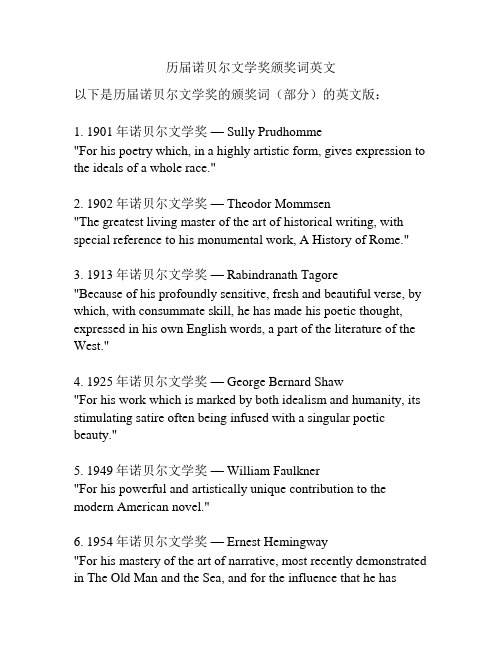
历届诺贝尔文学奖颁奖词英文以下是历届诺贝尔文学奖的颁奖词(部分)的英文版:1. 1901年诺贝尔文学奖— Sully Prudhomme"For his poetry which, in a highly artistic form, gives expression to the ideals of a whole race."2. 1902年诺贝尔文学奖— Theodor Mommsen"The greatest living master of the art of historical writing, with special reference to his monumental work, A History of Rome."3. 1913年诺贝尔文学奖— Rabindranath Tagore"Because of his profoundly sensitive, fresh and beautiful verse, by which, with consummate skill, he has made his poetic thought, expressed in his own English words, a part of the literature of the West."4. 1925年诺贝尔文学奖— George Bernard Shaw"For his work which is marked by both idealism and humanity, its stimulating satire often being infused with a singular poetic beauty."5. 1949年诺贝尔文学奖— William Faulkner"For his powerful and artistically unique contribution to the modern American novel."6. 1954年诺贝尔文学奖— Ernest Hemingway"For his mastery of the art of narrative, most recently demonstrated in The Old Man and the Sea, and for the influence that he hasexerted on contemporary style."7. 1962年诺贝尔文学奖— John Steinbeck"For his realistic and imaginative writings, combining as they do sympathetic humour and keen social perception."8. 1982年诺贝尔文学奖— Gabriel Garcia Marquez"For his novels and short stories, in which the fantastic and the realistic are combined in a richly composed world of imagination, reflecting a continent's life and conflicts."9. 2005年诺贝尔文学奖— Harold Pinter"Who in his plays uncovers the precipice under everyday prattle and forces entry into oppression's closed rooms."10. 2017年诺贝尔文学奖— Kazuo Ishiguro"Who, in novels of great emotional force, has uncovered the abyss beneath our illusory sense of connection with the world."请注意,这仅仅是历届诺贝尔文学奖颁奖词的部分英文版,不包括全部的文学奖获得者。
斯坦贝克诺贝尔获奖感言中文版

斯坦贝克诺贝尔获奖感言中文版大家好,今天咱们要聊聊一个特别的故事。
你们肯定知道,美国作家约翰·斯坦贝克,他是诺贝尔文学奖的得主。
可你们知道,他的获奖感言是怎样的吗?这个感言并没有什么华丽的辞藻,反而是朴实无华,带着一种平实而真诚的情感,完全不像一个大作家的样子,倒更像是一个普通人站在台上,说出自己心里最真实的话。
就像是我们平时和朋友聊天时那种自然、随和的语气,不加修饰,情感却特别真挚。
你想想,这个诺贝尔文学奖的领奖感言本身,跟他的作品一样,都是那么的“接地气”。
说实话,斯坦贝克的获奖感言一点也不张扬,甚至有些谦虚。
你看,他说,自己写了这么多年,没想过有一天会站在这个领奖台上,拿这个奖。
他讲的是自己对文学的理解,不是那种高高在上的“我多伟大,我多了不起”,而是讲自己的故事,讲那些支撑他走到今天的东西。
比如说,斯坦贝克说,他的写作并不是为了取悦大众,也不是为了获得名声,而是为了在这个世界上留下些有意义的东西。
他甚至说,他的作品并不完美,甚至很多地方都做得不够好,但他始终坚持自己所信仰的东西。
这种不吹不擂、不夸大其词的态度,让人听了特别舒服。
不过,你也能从他的感言里感觉到一种深深的责任感。
他没有高高在上地把自己当成一个“天才”,也没把奖当作是某种无上的荣耀,而是将它当作一种对社会的责任。
他说,作家的任务是去关注那些被忽视的人,去讲述那些在社会的边缘挣扎的人物。
他讲了很多关于贫穷、关于无助、关于人性的事。
这些话,说实话,听了让人心里有点发酸。
他没有站在领奖台上大谈个人成就,反而是把所有的目光都投向了那些需要被关注的群体。
这一点,真的是让人特别感动。
斯坦贝克也特别重视“诚实”这个词。
他的作品里也一直强调这个观点——无论社会如何变化,作家都不能忘记去做一个诚实的人。
他认为,作家的使命就是要真实地反映世界,哪怕这个世界充满了丑陋与不公。
你要是读过他的《愚昧的太阳》或者《西风的死地》这些作品,就会发现,他的笔下充满了对社会问题的敏感,对人性的挖掘,对那些被压迫的群体的同情。
诺贝尔获奖感言英语作文

诺贝尔获奖感言英语作文Title: Nobel Prize Acceptance Speech。
Ladies and Gentlemen,。
I stand before you today profoundly humbled and deeply honored to accept this esteemed Nobel Prize. It is a moment of great significance, not just for me personally, but for the countless individuals whose unwavering support, inspiration, and dedication have propelled me to this extraordinary achievement.First and foremost, I extend my heartfelt gratitude to the Nobel Committee for bestowing upon me this prestigious award. To be recognized amongst the luminaries in my field is a privilege beyond words, and I accept this honor with a profound sense of responsibility.I would like to express my sincere appreciation to my mentors, colleagues, and collaborators who have walkedalongside me on this journey of discovery. Your guidance, encouragement, and intellectual camaraderie have been invaluable, shaping both my research and my character.To my family, whose unwavering love and encouragement have been my anchor through the highs and lows of academic pursuit, I owe a debt of gratitude that can never be repaid. Your sacrifices and unwavering belief in me have fueled my aspirations and inspired me to reach for the stars.I am also indebted to the institutions andorganizations that have provided the resources, infrastructure, and opportunities essential for the realization of my research endeavors. Your investment inthe pursuit of knowledge serves as a testament to the enduring importance of scientific inquiry in advancing the frontiers of human understanding.As I stand here today, I am acutely aware of the profound responsibility that accompanies this honor. The Nobel Prize is not merely a recognition of past achievements but a call to action, a challenge to continuepushing the boundaries of knowledge and innovation for the betterment of humanity.In a world fraught with challenges and uncertainties, it is incumbent upon us, as scientists and scholars, to harness the power of curiosity and creativity to confront the pressing issues facing our planet. Whether it be the quest for sustainable energy solutions, the search for cures to devastating diseases, or the preservation of our fragile ecosystems, let us remain steadfast in our commitment to making a positive impact on the world.In closing, I would like to dedicate this award to all those who strive tirelessly to make the world a better place through the pursuit of knowledge and the pursuit of truth. May we continue to draw inspiration from the legacy of past laureates and forge ahead with courage, compassion, and conviction.Thank you once again for this incredible honor. Together, let us dare to dream, to discover, and to make a difference.Sincerely,。
海明威诺贝尔文学奖致辞英文演讲稿
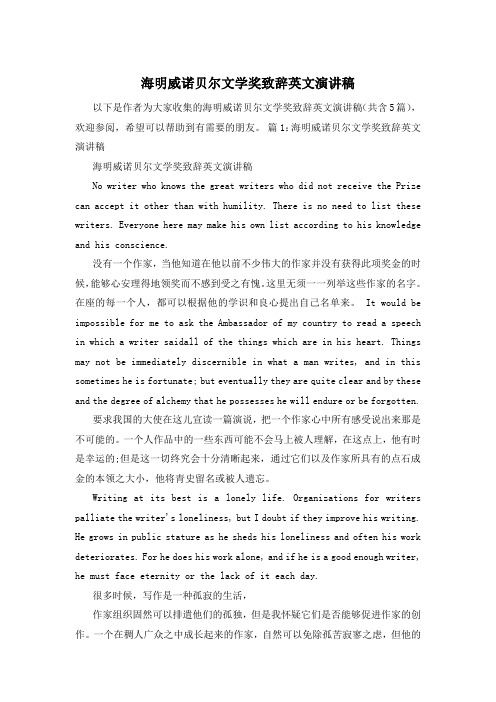
海明威诺贝尔文学奖致辞英文演讲稿以下是作者为大家收集的海明威诺贝尔文学奖致辞英文演讲稿(共含5篇),欢迎参阅,希望可以帮助到有需要的朋友。
篇1:海明威诺贝尔文学奖致辞英文演讲稿海明威诺贝尔文学奖致辞英文演讲稿No writer who knows the great writers who did not receive the Prize can accept it other than with humility. There is no need to list these writers. Everyone here may make his own list according to his knowledge and his conscience.没有一个作家,当他知道在他以前不少伟大的作家并没有获得此项奖金的时候,能够心安理得地领奖而不感到受之有愧。
这里无须一一列举这些作家的名字。
在座的每一个人,都可以根据他的学识和良心提出自己名单来。
It would be impossible for me to ask the Ambassador of my country to read a speech in which a writer saidall of the things which are in his heart. Things may not be immediately discernible in what a man writes, and in this sometimes he is fortunate; but eventually they are quite clear and by these and the degree of alchemy that he possesses he will endure or be forgotten.要求我国的大使在这儿宣读一篇演说,把一个作家心中所有感受说出来那是不可能的。
19xx年诺贝尔经济学奖获得者JohnForbesNash的获奖感言

19xx年诺贝尔经济学奖获得者JohnForbesNash的获奖感言Nature’s Gift to Science大自然献给科学的礼物Sydney Brenner1The title of my lecture is ??Nature?s Gift to Science.?? It is not a lecture about one scientific journal paying respects to another, but about how the great diversity of the living world can both inspire and serve innovation in biological research. Current ideas of the uses of Model Organisms spring from the exemplars of the past and choosing the right organism for one?s research is as important as finding the right problems to work on. In all of my research these two decisions have been closely intertwined. Without doubt the fourth winner of the Nobel Prize this year is Caenohabditis elegans; it deserves all of the honor but, of course, it will not be able to share the monetary award.我演讲的题目是《大自然献给科学的礼物》。
这不是一个关于一本科学杂志向另一本科学杂志表示敬意的演讲(因为Nature和Science同时也是两本著名的科学杂志的名字),而是关于与我们生活在一起的这多种多样的生物,看它们是如何激发我们的潜能,为我们生物学研究领域的创新作贡献。
莫言获奖感言中英
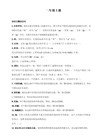
In an interview with South China Morning Post, Professor Xiao Ying of Tsinghua University said the award was “outside of my expectations, as Mo Yan’s works are still short on the idealism of pursuing humanity, which marks previous Nobel literature prize winners”.
中国社会科学院文学所所长陆建德在接受《二十一世纪英文报》记者采访时表示:“我真的没有想到。我很了解莫言,而很多人都不清楚他驾驭文字的功力到底有多棒。”
“His calligraphy is surprisingly beautiful. In his writing, he can make words live and breathe,” Lu said. “He is far ahead of other Chinese in the sense that he takes the critical perspective inside first, starting from criticizing himself instead of the outside world.”
“我们对弱点、黑暗面以及人性扭is it?
大学新生遭遇理财危机
中文 英文 双语 2012-10-17 来源:Wang Zi 21st Century Staff 阅读数:75915 字号 [大] [中] [小] 打印
获奖后不久,莫言在家乡山东高密接受记者采访时表示:“民间艺术、民间文化伴随着我成长,我从小耳濡目染这些文化元素,当我拿起笔来进行文学创作的时候,这些民间文化元素就不可避免地进入了我的小说,也影响甚至决定了我的作品的艺术风格。”
英文感言4篇

英文感言4篇篇一:hi everyone,my name is dongqi yang from china, i am horror to be here today and i am very happy to receive this award.as you can imagine, as international students in australia, the biggest challenge is english,i remembered that when i come here first time, there is a party in the house of my home stay. during the time, they played jokes and they laughed all the time, do you know how embarrassed that is, everyone laughed except you. so i pretend to understand the joke in another party, i saw everyone laugh and i laugh too in 5 seconds later. my home stay was surprised about that and asked me do you understand? ,and i answered no ,so why do you laugh? because i do not want to be embarrassed !but as i receive this award today, i want to thank to them, because they encourage me to be involved with the committee rar than staying in at home, play computer and speak chinese.when i came to wantirna college first time, i met liz collar who is international student coordinator. she is very kind to me, and she encourage me join src, i went to src meetings regularly all the time, but i didn t even know what src was! that is the reason why i told her, i don t want to go to src anymore. but she said why not? you should go and you have to go! i asked why? she said: because i said so!but as ii receive this award today, i want to thank her. she helps me a lot.truth be told, i am not the best student in wantirna college, but i appreciate this award and i will try my best in future.i think i got 10 seconds left, i want to thank to les and vera who is my lovely home stay, thanks to liz collar who is international student coordinator, i strongly want to thank to my mother, because she support me and gave me the opportunity to come to australia. and thanks to wantinran college, thanks to australia and finally, thanks to everyone to be here tonight.have a great night.篇二:第83届奥斯卡金像奖将于北京时间2月28日上午9点(当地时间2月27日下午17点)在洛杉矶柯达剧院举行,christian bale 获得第83届奥斯卡最佳男配角,下面是克里斯蒂安贝尔的奥斯卡火箭感言演讲视频和。
2001年诺贝尔文学奖英文颁奖词

2001年诺贝尔文学奖英文颁奖词1. 前言在文学界,诺贝尔文学奖被视为最高荣誉,每年颁发。
2001年,诺贝尔文学奖颁给了一位英文作家,他的作品带有强烈的历史和文化内涵,在文学界有着重要的影响。
本文将对2001年诺贝尔文学奖的英文颁奖词进行评估和阐述,以帮助读者更深入地了解这位作家和他的作品。
2. 评估2001年诺贝尔文学奖的英文颁奖词是由诺贝尔委员会发布的,在颁奖词中,对作家的作品和影响进行了充分的评价和肯定。
颁奖词中提到了作家的作品风格独特,充满了对历史和文化的探讨,对人类的理解和共鸣。
这些评价为我们提供了对这位作家作品的全面了解,也为我们理解文学作品的深度和广度提供了重要的线索。
3. 深度探讨在颁奖词中,诺贝尔委员会提到了作家作品的深刻内涵和影响力。
作家的作品在历史和文化方面展现了独特的观点和理解,对人类命运和情感的深刻剖析,以及对社会和政治的批判。
这些作品不仅仅是文学作品,更是对人类生活的思考和反思,具有深刻的哲理和思想内涵。
通过阅读作家的作品,读者可以得到对人类生活和情感的深刻理解,也可以从中获得启发和反思。
4. 广度阐述除了作家的作品深度方面,颁奖词还提到了作家作品的广度影响。
作家的作品跨越了不同的历史和文化背景,展现了多元的人类生活和情感。
这些作品所包含的不仅仅是个人的经历和情感,更是对整个社会和人类命运的关注和探讨。
作家通过自己的文学作品,将不同文化和历史背景的人们通联在一起,使读者能够感受到人类情感的共鸣和理解。
这种广度的影响,使作家的作品在国际文学界具有重要的地位和影响力。
5. 个人观点和理解在我看来,2001年诺贝尔文学奖的英文颁奖词对这位作家的作品进行了充分的评价和肯定。
作家的作品在文学界具有重要的地位和影响力,不仅仅是因为其深刻的思想和情感,更是因为作品所展现的历史和文化内涵。
这些作品使人们对人类生活和情感有了更深刻和全面的理解,也为国际文学界的发展和交流做出了重要的贡献。
诺贝尔生理学奖得主约翰·奥基夫在颁奖晚宴上英语演讲稿
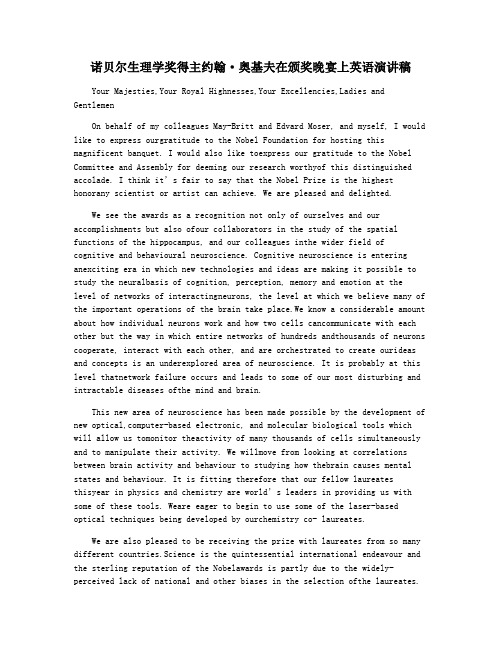
诺贝尔生理学奖得主约翰·奥基夫在颁奖晚宴上英语演讲稿Your Majesties,Your Royal Highnesses,Your Excellencies,Ladies and GentlemenOn behalf of my colleagues May-Britt and Edvard Moser, and myself, I would like to express ourgratitude to the Nobel Foundation for hosting this magnificent banquet. I would also like toexpress our gratitude to the Nobel Committee and Assembly for deeming our research worthyof this distinguished accolade. I think it’s fair to say that the Nobel Prize is the highest honorany scientist or artist can achieve. We are pleased and delighted.We see the awards as a recognition not only of ourselves and our accomplishments but also ofour collaborators in the study of the spatial functions of the hippocampus, and our colleagues inthe wider field ofcognitive and behavioural neuroscience. Cognitive neuroscience is entering anexciting era in which new technologies and ideas are making it possible to study the neuralbasis of cognition, perception, memory and emotion at thelevel of networks of interactingneurons, the level at which we believe many of the important operations of the brain take place.We know a considerable amount about how individual neurons work and how two cells cancommunicate with each other but the way in which entire networks of hundreds andthousands of neurons cooperate, interact with each other, and are orchestrated to create ourideas and concepts is an underexplored area of neuroscience. It is probably at this level thatnetwork failure occurs and leads to some of our most disturbing and intractable diseases ofthe mind and brain.This new area of neuroscience has been made possible by the development of new optical,computer-based electronic, and molecular biological tools which will allow us tomonitor theactivity of many thousands of cells simultaneously and to manipulate their activity. We willmove from looking at correlations between brain activity and behaviour to studying how thebrain causes mental states and behaviour. It is fitting therefore that our fellow laureates thisyear in physics and chemistry are world’s leaders in providing us with some of these tools. Weare eager to begin to use some of the laser-based optical techniques being developed by ourchemistry co- laureates.We are also pleased to be receiving the prize with laureates from so many different countries.Science is the quintessential international endeavour and the sterling reputation of the Nobelawards is partly due to the widely-perceived lack of national and other biases in the selection ofthe laureates.We believe that the future great contributions to our understanding of thebiological and physical world can come from citizens of any country in any part of the world. It isto the credit of the Nobel committees that they have steadfastly endeavoured to follow AlfredNobel’s wishes that the prizes recognise contributions to the welfare of humanity regardless ofcountry of origin, gender, race or religious affiliation.I want to end by recognising and thanking our many collaborators and colleagues toonumerous to mention in this short speech, our universities, UCL and NTNU, and our generousfunders.Thank you for your attention. Tack.感谢您的阅读,祝您生活愉快。
- 1、下载文档前请自行甄别文档内容的完整性,平台不提供额外的编辑、内容补充、找答案等附加服务。
- 2、"仅部分预览"的文档,不可在线预览部分如存在完整性等问题,可反馈申请退款(可完整预览的文档不适用该条件!)。
- 3、如文档侵犯您的权益,请联系客服反馈,我们会尽快为您处理(人工客服工作时间:9:00-18:30)。
约翰·斯坦贝克诺贝尔文学奖的英文获奖感
言
Banquet Speech
John Steinbeck's speech at the Nobel Banquet at the City Hall in Stockholm, December 10, 1962
I thank the Swedish Academy for finding my work worthy of this highest honor.
In my heart there may be doubt that I deserve the Nobel award over other men of letters whom I hold in respect and reverence - but there is no question of my pleasure and pride in having it for myself.
It is customary for the recipient of this award to offer personal or scholarly ment on the nature and the direction of literature. At this particular time, however, I think it would be well to consider the high duties and the responsibilities of the makers of literature.
Such is the prestige of the Nobel award and of this place where I stand that I am impelled, not to squeak like a grateful and apologetic mouse, but to roar like a lion out of pride in my profession and in the great
and good men who have practiced it through the ages.
Literature was not promulgated by a pale and emasculated critical priesthood singing their litanies in empty churches - nor is it a game for the cloistered elect, the tinhorn mendicants of low calorie despair.
Literature is as old as speech. It grew out of human need for it, and it has not changed except to bee more needed.
The skalds, the bards, the writers are not separate and exclusive. From the beginning, their functions, their duties, their responsibilities have been decreed by our species.
Humanity has been passing through a gray and desolate time of confusion. My great predecessor, William Faulkner, speaking here, referred to it as a tragedy of universal fear so long sustained that there were no longer problems of the spirit, so that only the human heart in conflict with itself seemed worth writing about.
Faulkner, more than most men, was aware of human strength as well as of human weakness. He knew that the understanding and the resolution of fear are a large
part of the writer's reason for being.
This is not new. The ancient mission of the writer has not changed. He is charged with exposing our many grievous faults and failures, with dredging up to the light our dark and dangerous dreams for the purpose of improvement.
Furthermore, the writer is delegated to declare and to celebrate man's proven capacity for greatness of heart and spirit - for gallantry in defeat - for courage, passion and love. In the endless war against weakness and despair, these are the bright rally-flags of hope and of emulation.
I hold that a writer who does not passionately believe in the perfectibility of man, has no dedication nor any membership in literature.
The present universal fear has been the result of a forward surge in our knowledge and manipulation of certain dangerous factors in the physical world.。
